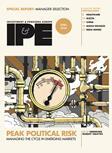Real estate investments on the other side of the Atlantic look different than on this side. At least that could be the impression when you compare the financial statements of property companies from the US and Europe. With increasing prices for properties, European property investors generally show higher profits than US-based property companies. Is an investment in European real estate thus a better opportunity?
Today, the financial world is generally divided between two major financial reporting systems, International Financial Reporting Standards (IFRS), issued by the International Accounting Standards Board (IASB) which have been adopted by the EU and many other economies and the US standards issued by the Financial Accounting Standards Board (FASB): US GAAP.
While IFRS is a set of principles-based standards that still fits into one book of some 2,500 pages, US GAAP is a set of rules-based standards that covers a multiple of volumes. IFRS puts a great emphasis on economic reality and the exercise of judgement, whereas US GAAP generally places emphasis on the legal form of transactions and arrangements over their economic substance.
Comparing the financial report of a large US-based property company with that of a comparable European investor quickly shows significant differences. Why is the profit and net asset value (NAV) of the European company so much higher? Why do the reports look so different? Why are the numbers actually incomparable when the companies are?
The different principles and rules of IFRS and US GAAP can lead to totally different outcomes. For the real estate sector, the differences are significant. With these differences, an investment decision between European or US real estate cannot be made easily. This is a huge obstacle in obtaining transparency in the financial and investment markets, and is bad for the global real estate industry.
The most important difference between US GAAP and IFRS for property companies is the valuation of their investment property. US GAAP prescribes to account for investment property at historical cost less depreciation, whereas IFRS recommends accounting for investment property at fair value, although it allows choosing the cost model. When the cost model is applied, the fair value should be in the notes. Thus the results (including revaluations) and net asset value of a property company reporting under IFRS (in a prosperous market) tend to be higher than those of a property company reporting under US GAAP. Fair value accounting is already widely accepted in the Anglo-Saxon and Northern European financial markets, but historical cost accounting is deeply rooted in other countries. It has always been the basis of tax laws, it is easily verifiable, there is no need for expert valuations and it reinforces the concept of prudence in accounting.
On the other hand, it does not have any reference to price developments in the marketplace, and does not relate to the basics of investor decisions: the time value of money and the concept of value creation through business models. Shareholders, analysts and accounting experts are generally convinced that the shift to fair value accounting will lead to better global financial transparency. Other important differences between the two accounting standards relate to:
n Presentation of results: IFRS and US GAAP prescribe different formats and inclusions in a company's financial statements.
n Joint venture accounting: IFRS and US GAAP have different principles for accounting for jointly controlled entities. This especially becomes apparent when a joint venture is owned by both a European and a US-based company.
n Acquisition accounting: acquiring properties or property companies can have totally different effects on the numbers (e.g. goodwill) under IFRS and US GAAP, especially with the concept of fair value accounting and the recognition of balance sheet items at the moment of the acquisition.
n Tax accounting: tax positions that do not relate to a REIT-regime can be accounted for on a nominal basis, or on a discounted basis. The latter approach is generally driven by the market, but IFRS and US GAAP differ on the conditions to be able to apply different tax rates depending on the structure of a future transaction.
There are many more differences, some with potential major impact, and a lot with minor or potentially no impact. Eliminating these differences would be a blessing for the financial markets and for the global real estate industry. The IASB and the FASB have agreed a road to convergence, identifying the major differences and setting out route maps to eliminate them. The two projects most important for the real estate sector are the fair value accounting option and the performance reporting project. For property companies, the impact could be significant, thus justifying an active role for both the European Public Real Estate Association (EPRA) and its US equivalent the National Association of Real Estate Investment Trusts (NAREIT).
NAREIT and EPRA now are in the process of determining common views on the convergences areas identified by the IASB and FASB. The cooperation between EPRA and NAREIT is crucial as we have a unique, one-time opportunity to create accounting standards that are useful, meaningful and supported by industry, shareholders and analysts. IFRS has only just landed in Europe, and is still not applied and interpreted consistently throughout the continent.
To achieve such consistent application will take the next few years. We believe consistency is crucial for the convergence project with US GAAP, since inconsistency of application could endanger the credibility of IFRS. Recently, the IASB has announced that until January 1 2009 no new IFRS standards will be issued that would require mandatory implementation. That decision will create the necessary stable situation for the current set of standards to crystallise.
Many fear that "convergence" will end in a one-way shift towards standards with a more US-based, rules-driven character than IFRS currently has. It could even be questioned to what extent a principles-based approach would be at all possible in the US, where all decisions are enforced on the letter or contract. This could seriously hamper the convergence process. For the real estate industry, both EPRA and NAREIT strive to achieve a framework of sensible accounting standards that do justice to the essence of real estate investments.












No comments yet